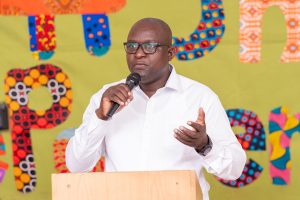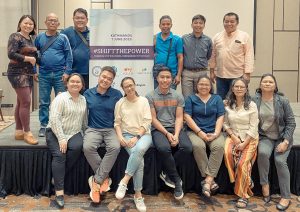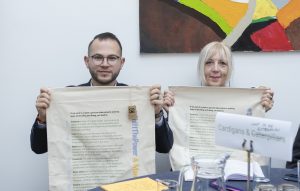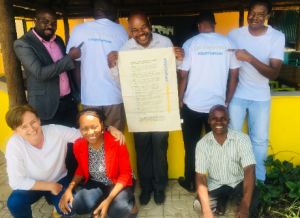An agenda made by many: Help shape the journey to, and our time in, Bogotá!
14 Jul 2023
Weaving the agenda
Conversations to develop the #ShiftThePower Global Summit agenda are now getting underway and you are invited to lead or take part in them. The plan is for different kinds of “weaving” activities to take place between now and December aimed at enabling broad participation between different people, organizations and parts of the system, whether they will be attending the Summit or not. A number of events on “the road to Bogotá” have already taken place in various parts of the world: you can read more about these here.
For those attending the Summit in person, weaving activities are aimed at ensuring that everyone who attends will have had the opportunity to co-create or participate in an event, or webinar, or just to make a connection beforehand, so that the conversations in Bogotá are “warmed up” in advance and we hit the ground running.
How to take part
If you are interested in helping to shape the agenda for the Summit please share your ideas via this form (also available in Spanish). The Summit is not being organized like a regular conference and there will be no formal “call for session proposals,” which means that now is the time to come forward with your ideas! Let us know via this form if you are interested in running local, national or regional dialogues, conducting research, compiling reports, garnering evidence or co-creating cross-system conversations which can be brought to the Summit. Is there a particular issue around which you would like to organize an activity? What is a “must have” on the agenda for Bogotá? You can also let us know what additional supports you may need (connections, further discussion of ideas, small grants, etc.).
At this stage, we are not looking for fully baked ideas, so you can be as vague or as specific as you like. The link will remain live for the time being and we will be accepting ideas on a rolling basis. However, activities can start as soon as you like! Grant resources are finite, so if you are looking for financial support, please complete the form sooner rather than later.
Key ideas and questions
The Summit is part of a much longer journey to build the flourishing communities and societies we want, where people and planet thrive. The Summit agenda will be shaped by some key ideas and questions:
1. Possibility in the face of crisis
In the face of mounting, multiple and inter-connected global crises – climate, democratic, economic – that pose existential threats to our planet, the recognition that new ways of deciding and doing are emerging around the world. This in the form of new practices, new institutional arrangements, new organizing models and new kinds of networked power, all which centre equity, dignity, trust and the inherent power of communities.
What will it take to birth this emergent system, to see communities as a source of social and economic innovation, of stewardship and knowledge, and of shared prosperity, rather than as passive recipients of the expertise and resources of mainstream development? How can we harness the power of one-off “islands of innovation” as the building blocks of long-term, systemic change, and challenge our notions of what it means to scale?
As a joined-up system of grassroots, national, regional and global actors that centre issues of power and equity at the heart of what they do, how can this emergent system both unlock the resources that exist within communities, and direct and deploy financial resources in ways that recognize and harness local assets, build local power and – of greatest importance – do no harm?
2. Reform and transformation of the current international funding system
The roots of international development lie in the Bretton Woods conference of 1944 and in institutions set up so the world could be developed from the top-down. It is currently being attacked both from the inside, for example through the decolonization movement that is exposing the “white saviour” myth, and from the outside by increasingly authoritarian states in which the space for civil society is closing. The localization agenda promises more equitable and accountable ways of ensuring that resources are better directed to local actors, but what will it take for that to become a reality and result in a real transformation of power? What will it take to forge new pathways between and among people who are, in one way or another, crafting and testing new people-centered practices that are driven from the bottom-up, or who are leading experiments and authentic efforts to shift power from within the existing system?
3. Equipping ourselves for the journey towards change
What new kinds of competencies, skills and approaches – cultural, material, technical and emotional – do we require to navigate and negotiate the kinds of new configurations of actors, alliances and networks needed to take us forward? What role can indigenous knowledge systems play and, at the same time, how can technology best be harnessed in service of a new operating system? What kinds of resources and energies are required? How can we respond to the urgency of the moment with the collective boldness and bravery that is needed? How, in this journey, can we hold ourselves accountable to our transformative intentions, as well as to justice and equity? And what needs to be let go?
Useful resources
A number of frameworks and resources may help guide and offer coherence to these activities:
- #ShiftThePower Manifesto for Change
- 12 Pathways to power collaboration areas (identified as essential pathways to shifting power by participants at the 2019 “Pathways to Power” Symposium)
- #ShiftThePower synthesis paper (which documents ongoing conversations)
- Systems to shift power report
- Findings from a parallel process on reforming international development








Je suis intéressé par vos activités, j aimerai d être parmis vous je suis un Professeur Univirsitaire retraité j’aitais dans l ‘école superieur d architecture à Rabat Maroc .
Juste pour moi , d après mes pensées il faut d ‘abord commencer par des bases des réflexions comment doivent réfléchir et pensées et créer..et d’après ces critères on peut commencer à résoudre des choses problématiques petit à petit .